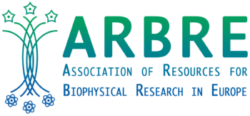Association of Resources for Biophysical Research in Europe
ARBRE is a charity, a not for profit organization, officially founded on the 1st of July 2021, and approved in October 2021 by the prefecture of Lyon.
History of the network.
Molecular-scale biophysics lies somewhere in between sample production (such as in the network P4EU) and structural (atomic) characterisation of samples and up until 2014 was only proposed as a “support” to structural biology within the Instruct network. As molecular-scale biophysics is not just “some functional characterization before obtaining a high resolution structure” the Instruct network was not the right place to develop the community, therefore in 2014 Patrick England and Thomas Jowitt started to gather people interested in molecular-scale biophysics
A kick-off meeting was held during the CTLS2014 meeting at Institut Pasteur → the acronym was coined and a community of its own was going to have a “common house”. Several meetings were held:
– In January 2015 about 50 people met in London at the 1st ARBRE meeting.
– July 2015 the 2nd ARBRE meeting was held as a satellite to EBSA2015 in Dresden together with P4EU → about 60 people.
– The 3rd ARBRE Meeting was in Zaragoza in February 2016 as a satellite to BIFI2016 → about 100 people.
From these meetings it was decided to apply for a COST action.
COST (European Cooperation in Science and Technology) Actions are meant to start, nurture and consolidate new networks.
An application for “Between Atom and Cell: Integrating Molecular Biophysics Approaches for Biology and Healthcare (MoBiEU – molecular biophysics in Europe)” was submitted by a group of researchers from 17 countries, coordinated by Patrick England and Thomas Jowitt and in October 2015 the action, CA15126, was approved.
Under this action, between April 2016 and March 2020 ARBRE-MOBIEU gathered 180 research laboratories, scientific infrastructures and core facilities from 30 different European countries.
There were 7 working groups that coordinated the building and strengthening of the network with outputs such as:
– 19 Newsletters to a mailing list of >400 people
– 4 annual plenary meetings, 15 WG meetings, 1 symposium (@EBSA2019), 1 satellite meeting (to EBSA2017)
– 12 training schools for 447 trainees from 45 countries (17 outside EU) → 54% women, 36% from ITC, a ratio of 2.4 trainee/trainer
– 52 STSM from 16 countries going to 15 host countries
– 3 benchmarking studies
– SOP for 15 different techniques
– Guidelines on protein quality control (in collaboration with P4EU)
– 31 papers in a special double issue of EBJ (2021, Vol 50)
After COST
The network was ready to be structured into a research infrastructure (RI), which after a successful application to Horizon 2020, was formed through MOSBRI, with 15 partners from 11 countries.
However, there still remains a need for a more inclusive network, thus resulting in the creation of the non-profit association ARBRE.
